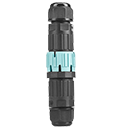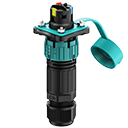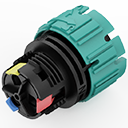Electrical connectors play a vital role in electrical and electronic systems, facilitating the connection and disconnection of wires and cables. However, when these components are exposed to moisture or water, it becomes imperative to implement proper protection measures to prevent damage or failure. In this article, we will explore various tips and techniques for creating waterproof electrical connectors, enhancing safety and reliability in wet environments.
1. Choose Waterproof Connectors:
The initial step in safeguarding electrical connectors against water is selecting connectors explicitly designed for this purpose. Options like hermetic connectors, sealed connectors, and IP67 connectors are readily available. These connectors come equipped with built-in seals and are crafted from weather-resistant materials, ensuring effective protection against water and dust. Prioritize these connectors to safeguard your electrical equipment from potential damage caused by environmental elements.
2. Use Waterproof Connection Boxes:
In conjunction with suitable connectors, incorporating waterproof connection boxes is highly recommended. These boxes are purpose-built to shield electrical connections from water and moisture infiltration. Crafted from plastic or metal, these boxes feature built-in seals to prevent liquid penetration. Place the connections inside the box and securely close it to guarantee comprehensive protection against water ingress.
3. Waterproof Electrical Tape:
An alternative solution is the application of waterproof electrical tape, typically composed of materials like silicone or rubber with a robust adhesive layer. Wrap the connectors and connections meticulously with waterproof electrical tape, ensuring full protection. Properly overlapping the layers of tape enhances the effectiveness of the seal, providing an additional barrier against moisture.
4. Silicone Sealant:
Silicone sealant stands out as a widely employed material for sealing electrical connections against water. Apply silicone sealant to areas where wires enter connectors or any potential cracks or openings. It is crucial to use a sealant specifically designed for electrical use and adhere to the manufacturer’s instructions for correct application. Silicone sealant forms a durable and flexible barrier, effectively preventing water infiltration.
5. Epoxy Resin:
For enhanced protection, consider the application of epoxy resin. Epoxy resin is a water-resistant material that forms a protective layer upon hardening. Commonly utilized in industrial and underwater applications, epoxy resin provides a robust shield for electrical connections. Following the manufacturer’s instructions, apply the resin after making electrical connections, ensuring complete coverage for effective protection against water.
Ensuring the safeguarding of electrical connectors against water is crucial to prevent damage and malfunctions in electrical systems. Utilizing waterproof connectors, connection boxes, suitable waterproof electrical tape, silicone sealant, and epoxy resin collectively ensures effective protection. However, it is paramount to highlight that when dealing with electricity, strict adherence to safety regulations is essential. If needed, seek the expertise of a qualified electrician to ensure proper installation and overall safety.











9.jpg)

0 Comments